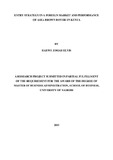| dc.description.abstract | The choice of entry mode has become a crucial strategy decision for firms wishing to enter foreign markets. On their part, these strategies have an effect on performance and its duration. This study aimed to establish the entry strategy adopted by Asea Brown Boveri (ABB) in the industrial automation industry in Kenya and to determine the effect of that entry strategy on performance. The research design was a case study; considered appropriate because the focus of the study was to answer “how” and “why” questions. The study relied on both primary and secondary data. Primary data was collected using an interview guide focusing on entry strategies and performance. Secondary data was collected on performance for the duration of the study from the corporate plans of the company and published financial information as obtained from company journals, bulletins and financial statements. Data was analysed using content analysis as the study collected data that was qualitative in nature. The study established that ABB has adopted exporting, franchising and foreign direct investment (FDI) strategies. The study further found that the entry strategies adopted by the company led to growth in customer numbers. They also led to an increased number of new products and services with new products being released in the market to stay ahead of competition and in response to the ever evolving demand for energy efficiency. The study also found that the strategies have improved return on investment for the company, economic value add, perceived value of products, and reliability of the company‟s products and services. The study recommends that multinational corporations (MNC‟s) continue investing in various foreign marketing strategies in order to meet company objectives. Further, the MNC should study the foreign market before adopting any strategy to ensure take up of market-centric strategies. On policy, the study recommends that the government put emphasis on fiscal and monetary policies that will encourage more FDI by MNC‟s. The study further recommends the need to create a suitable mechanism to encourage automation MNC‟s to enter the Kenya market, in order for them to channel resources toward investment projects. This study has two major implications: First, foreign MNC‟s entering new markets on the continent will consider a region-based approach and chose hub countries as start points as is the case of Kenya for ABB. Secondly, Industrial Automation MNC‟s entering new markets will opt to begin with exporting to test the market, then proceed to franchising as a means of establishing customer engagement and then conclude with FDI on the back of sustained growth and strong market prospects, and to cement engagement with long standing customers. | en_US |

